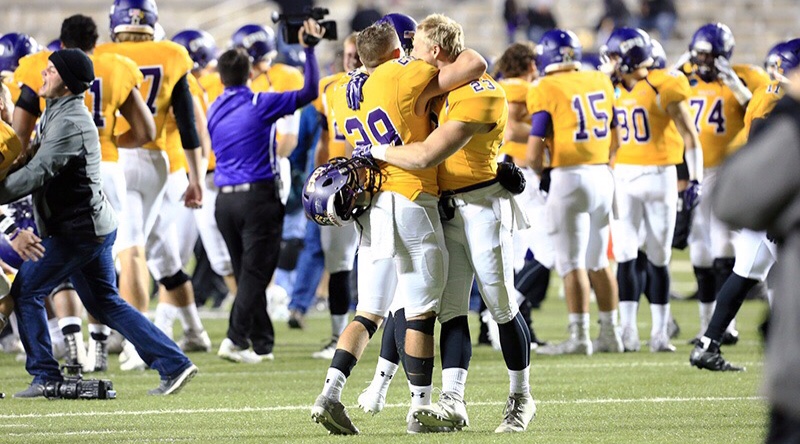
The University of Mary Hardin-Baylor must vacate wins in which a student-athlete competed while ineligible, according to a decision issued by the NCAA Division III Infractions Appeals Committee.
In the NCAA Division III Committee on Infractions decision regarding Mary Hardin-Baylor, the committee found that football staff members, led by the head coach, violated recruiting and extra benefit rules by providing impermissible transportation.
“This decision will hurt for a long time,” said UMHB football coach Pete Fredenburg, “but I have learned from this experience, and our program will continue to move forward and build on our legacy going into the 2020 season.”
Vacating records means there is no NCAA Division III football champion for the 2016 season.
UMHB self-reported the violations to the NCAA in April of 2018. The COI released its report on Oct. 10, 2019. The committee accepted all of UMHB’s corrective actions and self-imposed penalties, which included a two-year probation period for the football program, enhanced compliance training, and a $2,500 fine. Additionally, UMHB suspended Fredenburg for three months without pay and for the first three games of the 2018 football season.
In its appeal, the university argued that the vacation of records penalty prescribed by the Committee on Infractions was excessive such that it constitutes an abuse of discretion. The university said the existence, in this case, of only one of the factors contemplated by the bylaw related to the vacation of records penalty is not sufficient for the prescription of the penalty, and it said that the Committee on Infractions failed to address the other six factors in its decision. It also argued that no competitive advantage was gained when the benefit was provided, and case precedent did not support the penalty.
The case involved the providing of local transportation by coaching staff and centered around the loan of Fredenburg’s 2006 Subaru to one student-athlete prior to and during the 2016 season and again during the 2017 season. These actions violated NCAA rules, including impermissible benefits, and head coach responsibility. The car was provided for use for approximately 18 months, according to the NCAA's initial decision.
The Committee on Infractions upheld the decision, saying that the penalty was “fair and consistent with both the authorizing legislation and past cases.”
For a penalty to be overturned by the Infractions Appeals Committee, the university must demonstrate both that the penalty is excessive, and it is an abuse of discretion.
In its decision, the Infractions Appeals Committee noted the NCAA rule detailing when the vacation of records penalty can be applied does not require more than one of the outlined circumstances to be present in a case for the Committee on Infractions to prescribe it. In this case, the Infractions Appeals Committee noted one of the circumstances, direct or knowing involvement of a coach or institutional administrator, was present. The Infractions Appeals Committee said the university agreed that there was a student-athlete who participated while ineligible and the head coach had directed involvement in the violation of NCAA rules.
When reviewing case precedent, the Infractions Appeals Committee noted the Committee on Infractions’ case history shows that it has routinely prescribed a vacation of records when an ineligible student-athlete competes.
After reviewing the arguments and case record, the Infractions Appeals Committee did not find the vacation of records penalty was excessive, and it affirmed the penalty.
“This process has taken more than two years to complete, and we are deeply disappointed by this final decision,” said Randy O’Rear, UMHB president. “We believe it is a harsh penalty, especially for all the student-athletes who had no part in the infractions. Today’s decision could cause serious concern about whether the current NCAA enforcement system will encourage or discourage cultures of integrity and self-reporting for those facing similar situations in the future. As soon as we became aware of rules violations, we took immediate and decisive action and we self-reported to the NCAA. But in the end, student-athletes who had nothing to do with the violations have been stripped of their team accomplishments by the NCAA.”
The members of the Infractions Appeals Committee who heard this case were William J. Fritz, chair of the Division III Infractions Appeals Committee and president at Staten Island; Lauren S. Haynie, athletics director at Brandeis; and Kate Roy, associate commissioner of the North Atlantic Conference.